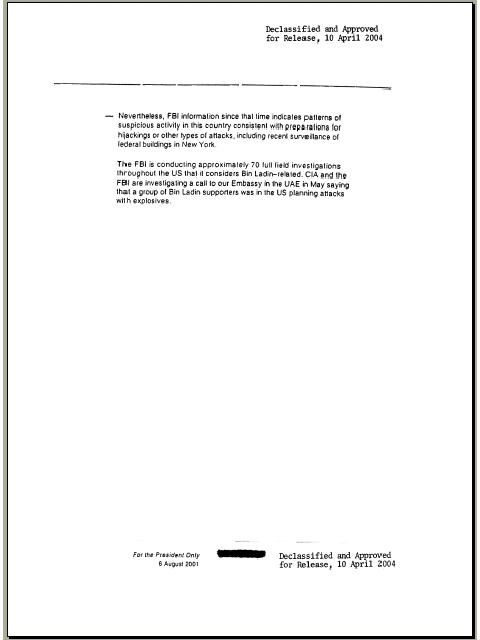April 11, 2004
Release of Presidentís Daily Brief, Lessons for the Intelligence Community
The August 6th President's Daily Brief was released late Saturday, titled, "Bin Ladin Determined To Strike in U.S." The memo did not contain any specific warning of the strikes that occurred only 36 days later but did present fresh evidence that terrorists were planning hijackings and attacks with explosives inside the United States. The Los Angeles Times blows up images of the most ominous paragraphs and reprints them, and I've inserted them below:


Slate summarized newspaper coverage in "Today's Papers":
- The Aug. 6 PDB has been a subject of controversy for years, even more so since Thursday, when National Security Adviser Condoleezza Rice was asked about it during her sworn testimony before the 9/11 commission. Despite Rice's contention "this was a historical memo" that didn't merit special action, the papers all note that the PDB did in fact include some new intelligence, as has been hinted for days. The LA Times goes as far as to speculate, in a separate Page-One analysis, that Rice has damaged her credibility with that statement.
Among the PDB's most non-historical warnings are its two final paragraphs. The first states that, despite being unable to corroborate a 1998 report that Bin Laden was looking to hijack planes,
Ö FBI information since that time indicates patterns of suspicious activity in this country consistent with preparations for hijackings or other types of attacks, including recent surveillance of federal buildings in New York.
In addition, it continues,
The FBI is conducting approximately 70 full field investigations throughout the US that it considers Bin Ladin-related. CIA and the FBI are investigating a call to our Embassy in the UAE in May saying that a group of Bin Ladin supporters was in the US planning attacks with explosives.
After the White House released the PDB, officials held a conference call with reporters and issued a written rebuttal, which a New York Times news analysis says was twice as long as the PDB itself. "None of the information relating to the 'patterns of suspicious activity' was later deemed to be related to the 9/11 attacks," the document said. Administration officials explained that the suspicious casing of federal buildings was later determined to be "tourist activity" and that the embassy call has never been linked to 9/11. (The NYT's lead and analysis point out that the White House admitted it couldn't rule out a connection, either).
The Washington Post's lead is alone in reporting on the PDB's creation. According to a "U.S. government official," the CIA analyst who prepared the briefing obtained the two final items from the FBI at the last minute, in an effort to sound a more strident alarm about Bin Laden. "The agency doesn't write a headline like that if it doesn't want to get attention," said a separate "former administration official," who sounds an awful lot like Richard Clarke. "The CIA did not believe Bush policymakers were taking the threat to the U.S. seriously."
An accompanying above-the-fold WP article suggests, however, that no one was taking the threat seriously that summer, even after the Aug. 6 briefing. "In a pre-9/11 world, it was like, 'Check it out and see what you find and get back to us after Labor Day,' " said a former Bush aide, "who remains close to White House" but refused to be named to "avoid angering the President and his staff." "It wasn't just the president who was on vacation. It was the whole government. It was the Bureau [FBI] and the Agency [CIA], too. The attention to the threats was above and beyond normal, but it obviously wasn't enough."
According to the NYT's lead, "no White House has ever made public a copy of a President's Daily Brief, a document that has been produced by the C.I.A. for presidents since the 1960's." But the WP disagrees: "PDBs have been released in the past, but current CIA Director George J. Tenet has tried to put them in a non-releasable category." Only the LAT clarifies: "Similar documents from other administrations have been declassified, but years after the presidents they were prepared for left office."
The question now is, if the President had known about this, should he have done something? Or rather, why wasn't this paid attention to? The length of the PDB in this case is unusual on its face, warranting some sort of increased Administration attention span.
- Arik
Posted by Arik Johnson at April 11, 2004 01:08 PM | TrackBack "Competitive Intelligence applies the lessons of competition and principles of intelligence to the need for every business to gain awareness and predictability of market risk and opportunity. By doing so, CI has the power to transform an enterprise from also-ran into a real winner, with agility enough to create and maintain sustainable competitive advantage."
"Competitive Intelligence applies the lessons of competition and principles of intelligence to the need for every business to gain awareness and predictability of market risk and opportunity. By doing so, CI has the power to transform an enterprise from also-ran into a real winner, with agility enough to create and maintain sustainable competitive advantage."
